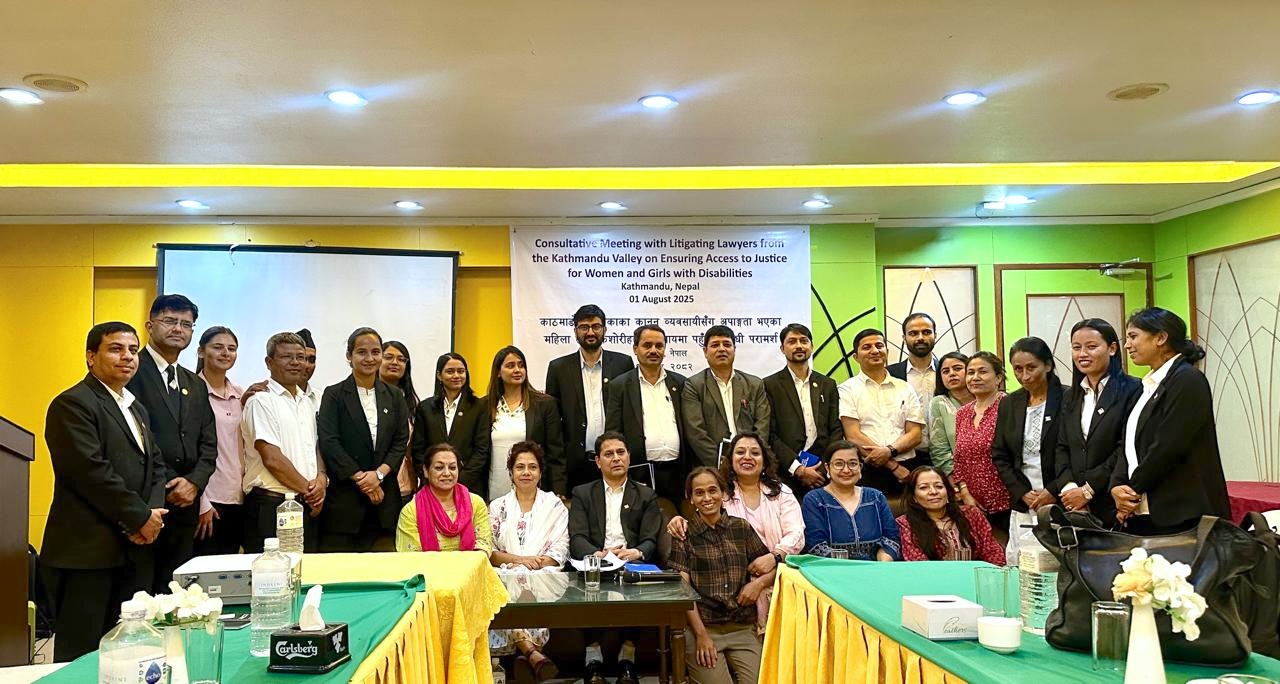At a consultative meeting held on 1 August 2025, lawyers from the Kathmandu Valley, Nepal, highlighted the systemic inaccessibility of the country’s justice system to women and girls with disabilities. Organized by the International Commission of Jurists (ICJ), in partnership with the Forum for Women, Law and Development (FWLD) and the Nepal Disabled Women Association (NDWA), and coordinated by the Special Court Bar Association, the meeting brought together 24 lawyers actively engaged in court-based litigation.
Participants underscored the multiple, intersecting barriers that women and girls with disabilities continue to face in accessing justice. These include:
- negative stereotypes that portray them as dependent or incapable, undermining their credibility in legal proceedings;
- inadequate provisions to ensure that witness testimony can be given privately or under protective measures to ensure witness safety;
- lack of recognition of their legal capacity and absence of supported decision-making mechanisms;
- lack of gender sensitive approaches;
- physically inaccessible court premises; and
- failure to provide necessary procedural accommodations, such as interpreters, legal aid, intermediaries and communication and information formats accessible to persons with disabilities.
Presenting on the current challenges, Dr. Shashi Nath Marasini, a litigating lawyer, noted:
“Although the Constitution and the Act Relating to the Rights of Persons with Disabilities guarantee equal access to justice, these promises often fall short in practice, especially for women and girls with disabilities. We have seen clients unable to even enter courtrooms or communicate effectively due to a lack of procedural accommodations. Justice must be inclusive, both physically and procedurally, or it will remain out of reach for many.”
Dr. Mandira Sharma, ICJ Senior International Legal Adviser, presented an overview of the national legal guide being developed by the ICJ to address discrimination against women and girls, including those with disabilities with respect to their access to justice.
“Access to justice cannot be meaningful without addressing the intersection of gender and disability. Women and girls with disabilities face, unique and compounded barriers that our legal systems must urgently confront,” she said.
“Lawyers, through their Bar units, can play important roles in confronting and dismantling these barriers.” she added.
Participants agreed on the need for joint advocacy towards:
- Revision of laws that fail to recognize the legal capacity of persons with disabilities;
- Refurbishment of court infrastructure to ensure accessibility for all;
- Integration of reasonable and procedural accommodations into court procedures;
- Express recognition and challenging of discriminatory attitudes and negative stereotypes against women and girls with disabilities;
- Provision of mandatory training for lawyers and other justice sector actors on disability rights and gender-based discrimination;
- Strengthening collaboration between legal professionals and organizations of persons with disabilities;
The meeting concluded with a shared commitment among the participating lawyers to advocate for enhanced access to justice for women and girls with disabilities, both within their respective bar units and through ongoing collaboration with the judiciary.
Background
The ICJ, in collaboration with its local partners in Nepal, FWLD and NDWA, is developing a national guide to address discrimination against women and girls, including those with disabilities, for justice sector across the country.
The guide will be informed by consultations with a wide range of stakeholders, including judges, litigating lawyers, lawyers with disabilities and those working on disability rights, court officials, the Nepali Police, members of local judicial committees, organizations of persons with disabilities, and human rights advocates.
The development of this guide is part of the ICJ’s broader initiative, Empowering Non-Discrimination and Advancement for Women and Girls, Including Those with Disabilities, implemented in Kenya, Nepal and Uzbekistan. The initiative aims to strengthen the rights and status of women and girls, including those with disabilities, by addressing systemic gender and disability-based discrimination within justice systems.
As part of this initiative, the ICJ recently made a submission to the UN Human Rights Council’s Working Group on the Universal Periodic Review (UPR), ahead of the review of Nepal’s human rights record scheduled for January 2026. In the submission, ICJ and its partners called for concrete action to address gender and disability-based discrimination.
Additionally, in January 2025, the ICJ made a submission to the Committee on the Elimination of Discrimination against Women ( the Committee), raising concerns on discriminatory practices detrimentally affecting the exercise of reproductive rights by women and girls with disabilities and their access to healthcare. In its Concluding Observations on Nepal issued in February 2025, the Committee responded by issuing several recommendations to the Nepali authorities, including a call to “ensure women and girls with disabilities have access to justice and healthcare services, including sexual and reproductive health services, with any examination or treatment only being performed with their free and informed consent” (para. 49, Concluding Observations).
In addition, as part of the ICJ’s global initiative on disability rights, the ICJ co-hosted a regional convening on access to justice for persons with disabilities on 11-12 May 2024 in Kathmandu. The convening resulted in the adoption of the Kathmandu Declaration on Access to Justice for Persons with Disabilities.
Contact
Karuna Parajuli, Legal Adviser, ICJ Asia and the Pacific Programme, e: karuna.parajuli@icj.org





